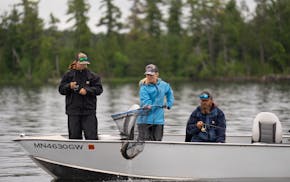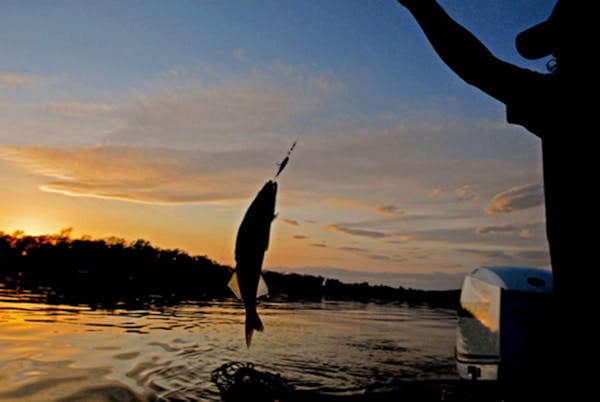Vic Davis knows firsthand the heartbreak Twin Cities shop owners felt recently while watching their life's work go up in flames on Lake Street and University Avenue, because his business and those of hundreds and perhaps thousands of others along the U.S.-Canada border are threatened with similar devastation.
The owner of Northern Wilderness Outfitters in Fort Frances, Ontario, across the Rainy River from International Falls, Davis employs two Twin Otter floatplanes each summer to fly Minnesota anglers and others to 16 lake cabins he owns in northwest Ontario.
An American with permanent Canadian residency, Davis spent $400,000 this spring preparing for a summer fishing season that has yet to begin because U.S. anglers can't get into Canada because of the coronavirus pandemic.
The news Wednesday, Davis said, that the border between the two countries will remain closed at least until July 21 arrived like a punch in the gut.
"It's one thing to lose your job," he said. "It's another to lose your job and your business at the same time."
While some Minnesota resorts have benefited from the border closure, motels and other tourist-related businesses in International Falls and other border towns have been devastated.
"Our retail businesses, the ones that are open, are down about 30 percent this summer," said Tricia Heibel, president of the International Falls Area Chamber of Commerce.
Motels in town that typically are full, particularly on summer weekends, sit nearly empty. And long lines at grocery stores and gas stations where anglers and other vacationers stock up before crossing into Ontario have evaporated.
“Our government thinks the virus is a lot worse in the U.S. than it is in Canada and if they open the border, Americans will come up here and infect everyone. ”
As many as 3,000 vehicles ply the bridge connecting International Falls and Fort Frances on typical summer days. Now fewer than 50 do.
"Not only are we missing the tourists, but about 50 percent of our businesses is from Canadians who cross the border to shop because most everything is cheaper here," said Tim Shuff, who with his son, Aaron, owns Sportsmen's Service, an International Falls sporting goods store founded in 1936.
Minnesotans who booked fishing outings in the far north this summer are frustrated, too.
Mike Schuett of Emily, Minn., had planned next week to take his grandson, Zack Springborn, to a remote Ontario outpost cabin to celebrate Zack's recent graduation from Irondale High School.
A friend of Schuett's, Mark Harrington, and his son, Matt, a Hill-Murray graduate this year, were eagerly anticipating the floatplane fishing adventure as well.
Schuett and Harrington had placed deposits on the trip months ago. Now the payments have been rolled over for a trip next summer.
"It's disappointing," Schuett said. "But there's nothing we can do about it."
Laurie Marcil, executive director of Nature and Outdoor Tourism Ontario in North Bay, Ontario, said some Canadian resorts and fishing camps might go under.
"We're all getting sick and tired of being sick and tired," said Marcil, whose association comprises about 300 member resorts and outfitters. "Our surveys suggest about 60 percent of our members are in dire financial straits."
Canadian tourism operators are pleading for government help, Marcil said, in the form of tax credits or cash infusions. Especially problematic are the last-minute notices by the two governments that the border will remain closed. Scheduled to reopen May 21 and then June 21, the two governments announced only days ahead of those deadlines the border would be shuttered another month.
"Resorts can't plan for staffing and supplies in that short of time," Marcil said. "They still had full camps of Americans planning to come if they had been allowed to open [beginning Sunday], and they had to organize accordingly. Now, again, the border won't open."
Totem Lodge on the Canadian side of Lake of the Woods is the largest such freshwater operation in North America, with 350 beds, 100 boats and motors and more than 200 employees. The lodge and its sister camps serve 6,000 guests each summer, the vast majority Americans.
"Our [Canadian] government is just killing us," owner Eric Brown said, adding he had considered applying for a $2 million government loan to cover his costs this year but couldn't afford the payments.
"Our government thinks the virus is a lot worse in the U.S. than it is in Canada and if they open the border, Americans will come up here and infect everyone," Brown said. "But we're already open for Canadian guests and we have all the safety protocols in place. Additionally, the government could start testing at the border, that's what we've advocated, and we could do it at the resort, too, if necessary. It could all be done."
With tens of thousands of lakes and the largest concentration of hunting and fishing camps in Canada, the region of Ontario just north of Minnesota is especially vulnerable to the border-closing downturn.
Minnesotans also feel particularly targeted, generations of whom consider Canadian fishing trips a rite of summer.
“Not only are we missing the tourists, but about 50 percent of our businesses is from Canadians who cross the border to shop because most everything is cheaper here.”
John Naimian, owner of Oak Lake Lodge, an Ontario fly-in operation on the English River system, said all but 1% of his clients are Americans, and most are Minnesotans.
Naimian's employees drive each summer from northern Quebec, half a continent away, and he plans to pay them through July 21, even though he has had "zero income."
"If the border doesn't open in another month, I will have to decide whether to keep my employees until September, like I usually do, with no income for me and no tip money for them, which is a big part of their pay," he said.
"I've lost a lot of sleep over it. Finally, I decided I'll live with it however it turns out."
Anderson: He paddled solo into the BWCA and didn't come back

Anderson: In early June, Minnesota fish are begging to be caught. Won't you help?


